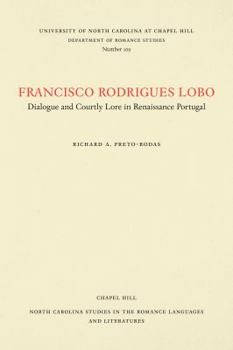Francisco Rodrigues Lobo: Dialogue and Courtly Lore in Renaissance Portugal
This work examines the dialogue tradition as it shaped the structure and themes of Lobo's seventeenth-century classic. Lobo's departure from earlier views of courtly lore is shown in his preference for social eloquence and literary cultivation over nobility of character and physical prowess.
Format:Paperback
Language:English
ISBN:0807891096
ISBN13:9780807891094
Release Date:January 1971
Publisher:Unc Department of Romance Studies
Length:190 Pages
Weight:0.62 lbs.
Dimensions:0.4" x 6.0" x 9.0"
Customer Reviews
0 rating





